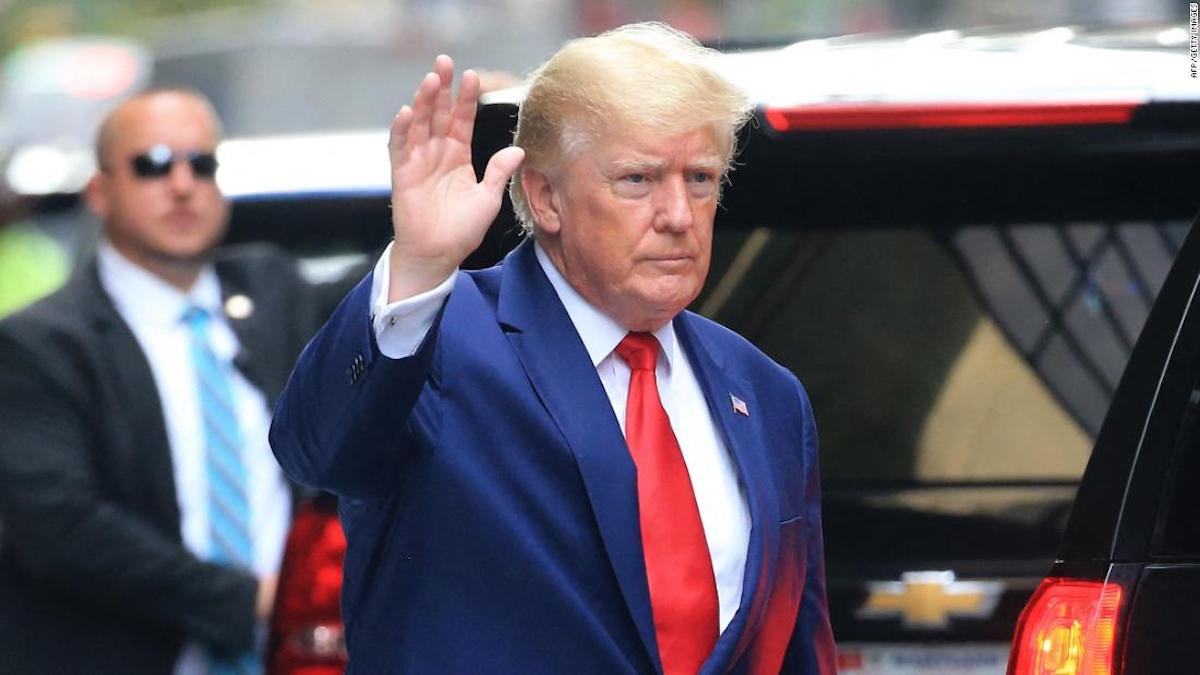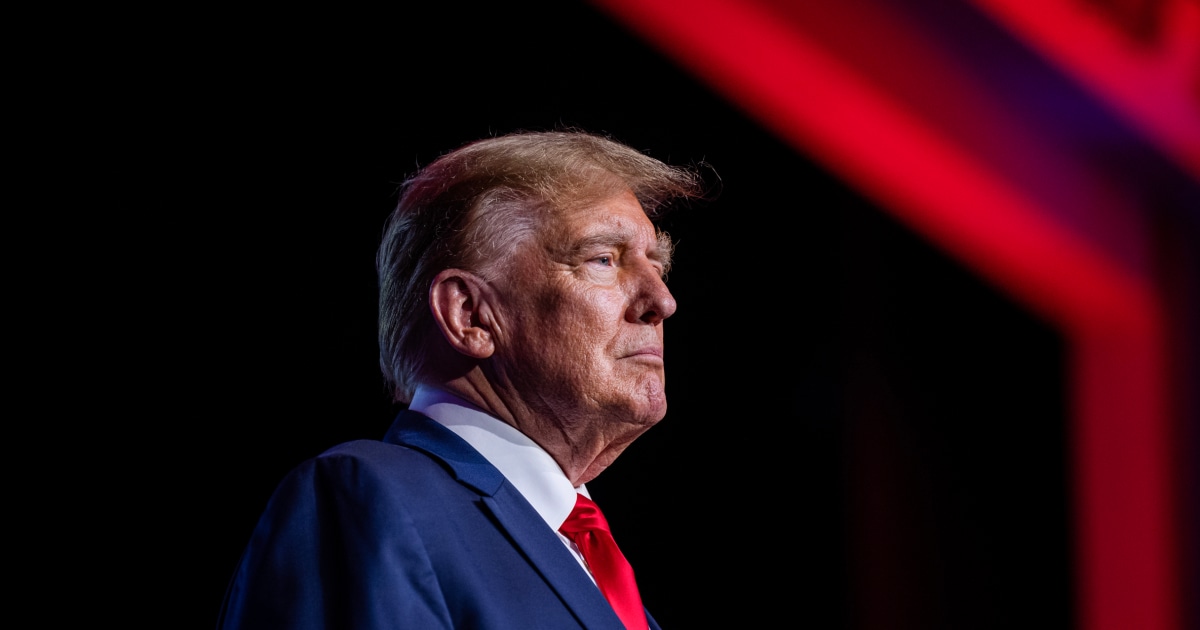Why did Trump spend much of his presidency at Mar-a-Lago?
2:32
(CNN) --
Attorney General Merrick Garland used an unexpected and unorthodox legal chess move to present former President Donald Trump with an opportunity to do something or shut up.
After three days of withering criticism of Trump, outrage from Republicans and feverish speculation about why, exactly, the FBI searched Trump's Florida home, Garland petitioned a federal court in South Florida for a motion to unseal a warrant. register.
Read the full story.
What will happen now?
Of course, Trump, whose lawyers have the court order and the corresponding receipt or inventory of the elements stolen by the FBI, could have done so at any time.
He will now have to decide if it's worth fighting in court, or if he should release the search warrant on his own.
The next few days will clarify whether Trump will accept this or fight it, and whether a judge will reveal the order and inventory or receipt.
What should we not expect?
The most important thing will not open.
advertising
"The most detailed document here is the affidavit," Elie Honig, a CNN legal analyst and former federal prosecutor, said during an appearance on CNN.
“That is the document that can normally be 20, 40, 100 pages, where prosecutors present chapter and verse, here is all our evidence that gives us probable cause.”
Neither Trump nor his lawyers have seen that document, and Garland did not say whether he would open it.
Is it enough to calm the ruckus?
Giving public access to the order will show that the Justice Department and the FBI are moving within the limits of the law, despite what Trump says.
After a few years of relative drabness and little drama in the Biden administration, it was a huge whiplash to return to the Trump era—when the country's government periodically seemed on the brink of implosion—with the former president accusing of the nation's order of a "witch hunt".
Change the channel to Fox and you'll hear the unproven theory that the Justice Department is on a fishing expedition.
"There's this flurry of activity related to January 6, and then we're told this other investigation had absolutely nothing to do with January 6," said Michael Mukasey, former attorney general for George W. Bush, who appeared on Fox. after Garland's comments.
"That's tough, and yet they had 30 FBI agents go in and seize documents that everyone presumably knew was there."
There is a mysterious witness
There are also new reports that a tip from a witness sparked the search after agents recovered boxes of documents in June based on a grand jury subpoena.
Mick Mulvaney, Trump's former chief of staff, surmised that the witness would have to be someone very close to the former president to even know about a safe at Mar-a-Lago.
"I didn't even know there was a safe at Mar-a-Lago, and I was chief of staff for 15 months," Mulvaney told CNN.
"So it would be someone very close inside."
He added: "If you know where the safe is and you know the documents are in 10 boxes in the basement, you're pretty close to the president."
This was the chain of events, according to the CNN report:
The criminal investigation began with concerns about missing documents raised by the National Archives, which made a criminal referral to the Justice Department after discovering highly sensitive documents among the materials recovered from Mar-a-Lago in January.
The 15 boxes contained some materials that were part of special access programs (SAPs), a classification that includes protocols to significantly limit who would have access to the information, according to a source familiar with what the Archives discovered on Monday. the boxes. That led to FBI interviews with grand jury subpoena officers for this week's court-authorized search and seizure of documents.
Presidential documents recovered at Trump residence in Florida 1:45
Why are these documents public property?
That Trump has apparently tried, despite a subpoena and negotiations, to keep the documents of his presidency out of the National Archives — like much of the Trump presidency — is unprecedented.
As for why presidential documents belong to the public, it's a relatively recent development that, like many restrictions on the presidency, has its roots in Watergate.
Historian Timothy Naftali, a New York University professor and former director of the Richard Nixon Presidential Library and Museum, told me the whole story.
His words, edited for length and flow, are in italics, and I've added some captions.
After leaving office, Nixon wanted his tapes and papers
A few days after Nixon's resignation, a moving truck pulled up in front of the White House. And the moving truck was there to pick up Nixon's documents and his tapes.
And the Ford management thought, "Oh my God, what are we going to do?"
So they went to his Office of Legal Counsel and asked, "Who owns the Nixon tapes and papers?" (Naftali is paraphrasing here and above).
Before Nixon, presidents owned their papers
The head of the Office of Legal Counsel at the time was a lawyer named Antonin Scalia. And Antonin Scalia said they belonged to presidents. It is our tradition in the United States, it goes back to George Washington that the president owns his documents, and his documents include everything that came to them and everything generated by his personal.
There was no differentiation between public and private documents. It was very similar to the way the King and Queen of England control documents.
There is nothing in the Constitution about this, and there was no law.
Congress had not gotten involved because it is a matter for the executive branch, and public opinion had never been such as to force presidents to consider their materials public.
Nixon traded access to his papers for his pardon.
Richard Nixon was within his rights to say, OK, they're mine and take them back to California.
The Ford administration realized they had a problem because if they turned the documents and tapes over to Nixon, people might see this as a cover-up.
So the Ford administration sought a deal with Nixon to ensure that the documents could be made available for court cases and that he could not destroy them for a certain period of time.
That agreement was part of the agreements that led to the pardon. Richard Nixon had to agree to this for Ford to forgive him.
Nixon agrees. Ford forgives.
Congress stepped in and passed a law to seize the Nixon papers.
And then Congress finds out and says, "Oh my God, no, no, no, no, no. Yes, it is true that the Ford administration will make sure that the documents that are needed for the court cases are available, but then Nixon can destroy what hasn't been cited. We don't want that." (Naftali is paraphrasing here).
And so Congress passed a law called the Presidential Materials and Recordings Preservation Act of 1974 that effectively seized all Nixon materials and deemed them public property.
Nixon's papers are seized.
this was a big deal
This was unprecedented in US history. Absolutely unprecedented. No material from a president had ever been treated in this way. All previous presidents—themselves or their heirs—had viewed the presidential materials as private documents. That includes when the CIA gave presidents national security stuff. All of that.
Just because something is private doesn't mean presidents were allowed to display it at their golf club.
So, Congress does this. And the Nixon tapes are seized and the Nixon materials are seized. They don't go to San Clemente (where Nixon lived in California).
Nixon takes Congress to court.
He also wanted to be paid
Nixon screams. He says, "Hey, wait a minute. Why am I being treated differently from all the other presidents?"
Nixon said, "I own this. It's not right. It's unconstitutional and contrary to the spirit of our tradition." So he went to court and said, "You're taking my property. Actually, you're taking my property."
They both wanted control of these documents, but also, if he was going to lose them, he wanted compensation. Basically, he argued, "Listen, these documents are worth something. And in retirement, I might need this money. So you owe me money for taking my property." (Naftali is paraphrasing here and above).
The Supreme Court sided with Congress
What the courts had to figure out was, okay, what really is the difference between private presidential materials — because everyone agreed there were certain materials that were private — and public materials.
There were a number of cases, and those cases laid the foundation for the definitions of public and private, which would later be enshrined in law by the Presidential Records Act of 1978.
Congress decided to pass a law that established what was public and what was private when it came to presidential records.
This means that the public holds presidential records
It means they are owned by the American people. The American people may not be allowed to see them yet, because they are classified. But at least ownership means the presidents couldn't destroy them.
That's why this mattered. Presidents then had to treat some of the products of their administration as belonging to someone else and thus could not destroy them at will.
That's why it mattered that Donald Trump flushed documents down the toilet, because he was actually flushing public property down the toilet and had no right to do so.
So the Presidential Records Act is a product of the Watergate period.
And it is a product of the American people and Congress accepting the powers of the presidency and concluding that the presidency was too strong and that presidents had taken advantage of areas of the law that the Constitution did not touch.
Is it worth an FBI search?
Naftali argued that all of this had to have been explained to Trump repeatedly during and after his presidency, so there is no legitimate excuse to take the documents.
In addition, Naftali argued that the government will provide secure storage so that the former president can access his documents at any time.
He was less clear when I asked if it was worth the FBI's search at Mar-a-Lago to protect the documents under this law, considering that it incited Trump supporters and unified Republicans behind him:
That judgment should not have been based on politics. It should have been based on an understanding of the appropriate measures, given the potential offence. And I'm going to reserve judgment until I see what it was they were seeking to recover.
There is no question that the US government, we, all of us, because national security is in our interest, have an interest in securing and protecting classified information.
And the question is why did the administration conclude, after speaking with representatives of President Trump for a considerable time, that our national security was somehow compromised, perhaps in jeopardy, by the lack of full support that the Department of Justice was receiving from Donald Trump and his representatives.
I warn all those who love this country not to make a snap judgment on the political costs of holding Donald Trump accountable.
In the modern era, there is no former president who has gone to war against our Constitution. Richard Nixon disagreed with his handling of the materials, he went to the Supreme Court and accepted the result. He did not go to war with our Constitution.
donald trump












